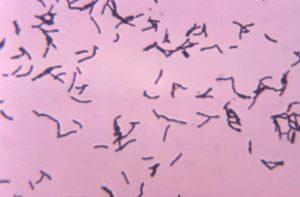
A commensal bacterial species: Bifidobacterium eriksonii (Public Health Image Library, CDC, Image ID:3082 )
When changing from one diet to another, one might not see immediate effects and the reason for this may lie with the type of gut microbiota present at the time of the diet change as described by a recent study by researchers at Washington University School of Medicine.
The diversity of the microbiota within a person is determined by several factors such as diet and antibiotic usage. The microbiome is not static but changes with time. For example, it has been shown that the increase in Westernization is associated with less diversity of the microbiome. This diversity may be restored by dietary changes which include lowering the amount of calories in the diet. Also, people who live together develop similar microbial communities and this indicates that there can be an exchange of gut microbiota between people who are closely associated.
The researchers, led by Jeffrey Gordon, wanted to investigate how the diet affects the human gut microbiome and how the microbiota present from one diet will respond to and affect a new diet. To do this, the researchers took fecal samples from participants on a calorie-restricted diet that was rich in plant matter. They also took fecal samples from people on an unrestricted diet that was typical of the American diet. The data showed that the people on the calorie-restricted diet had more diverse gut microbiota.
Next, the scientists colonized germ-free mice with the microbiota samples from the different human participants. They fed the mice calorie-restricted or American type diets. The mice with the American type diets had weaker responses as compared to the animals on the calorie-restricted diet. After co-housing the different mice together, the researchers found that the microbes from the calorie-restricted mice were taken up by the mice on the American-type diet and when these mice were given the calorie-restricted diet, they had improved responses to it.
The microbes that were passed from the mice on the healthier diet to the mice on the less healthy diet may aid in the understanding of what microbes are needed for a healthy gut microbiome. These could also be microbes which could be used in probiotics.
Journal article: Griffin 2017. Prior Dietary Practices and Connections to a Human Gut Microbial Metacommunity Alter Responses to Diet Interventions. Cell Host & Microbe
Article by Thandeka Moyo











